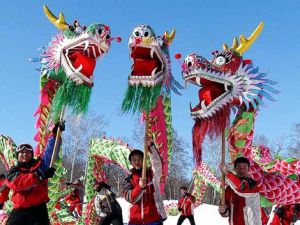Difference between revisions of "Dragon Heads-raising Day"
imported>Ciic m (Created page with ''''Dragon Heads-raising Day''' falls on the second day of the second lunar month, which is a traditional festival for Han nationality popular in most Chinese regions. The fes...') |
imported>Ciic |
||
| Line 1: | Line 1: | ||
| + | [[File:Dragon Heads-raising Day.jpg|thumb|Dragon Heads-raising Day]] | ||
| + | |||
'''Dragon Heads-raising Day''' falls on the second day of the second lunar month, which is a traditional festival for [[Han]] nationality popular in most Chinese regions. The festival is also embraced by many minorities such as the [[Miao]], [[Zhuang]], [[Man]], [[Dong]], [[Li]], [[She]], [[Bouyei]], [[Hezhen]] and [[Ewenki]]. | '''Dragon Heads-raising Day''' falls on the second day of the second lunar month, which is a traditional festival for [[Han]] nationality popular in most Chinese regions. The festival is also embraced by many minorities such as the [[Miao]], [[Zhuang]], [[Man]], [[Dong]], [[Li]], [[She]], [[Bouyei]], [[Hezhen]] and [[Ewenki]]. | ||
| Line 6: | Line 8: | ||
The Dragon Heads-raising Day is also called "Blue Dragon Festival", "Blossom-tide Festival" or "Spring-walking Festival", in which people will go to suburb with wine and food, singing and dancing to their heart's content. The food for the day shall be noodles and vermicelli. They call this "picking dragon tails". The people in [[Shanxi Province]] will even perform [[Yangge]] dance on that day, no less exciting than the way "[[Lantern Festival]]" is celebrated in other regions. | The Dragon Heads-raising Day is also called "Blue Dragon Festival", "Blossom-tide Festival" or "Spring-walking Festival", in which people will go to suburb with wine and food, singing and dancing to their heart's content. The food for the day shall be noodles and vermicelli. They call this "picking dragon tails". The people in [[Shanxi Province]] will even perform [[Yangge]] dance on that day, no less exciting than the way "[[Lantern Festival]]" is celebrated in other regions. | ||
| − | |||
[[category:tradition]] | [[category:tradition]] | ||
Latest revision as of 03:20, 23 February 2012
Dragon Heads-raising Day falls on the second day of the second lunar month, which is a traditional festival for Han nationality popular in most Chinese regions. The festival is also embraced by many minorities such as the Miao, Zhuang, Man, Dong, Li, She, Bouyei, Hezhen and Ewenki.
The origin of the festival is deeply related to one of the 24 solar terms - "excited insects". It's said that as the day comes, the land will wake up while the Yang Qi starts to rise. Dragons are auspicious omen in Chinese folk legends and they dominate wind and rain. As the folk saying goes, "dragon raises its head on the second day of the second lunar month". People hope that dragons will rise to make plentiful rain for the mankind and to facilitate spring plowing.
Meanwhile, since around the day of "excited insects", all insects will come out stirring up diseases, people also count on the dragons to suppress the poisonous insects.
The Dragon Heads-raising Day is also called "Blue Dragon Festival", "Blossom-tide Festival" or "Spring-walking Festival", in which people will go to suburb with wine and food, singing and dancing to their heart's content. The food for the day shall be noodles and vermicelli. They call this "picking dragon tails". The people in Shanxi Province will even perform Yangge dance on that day, no less exciting than the way "Lantern Festival" is celebrated in other regions.
